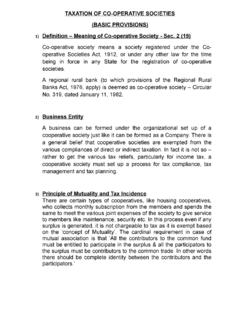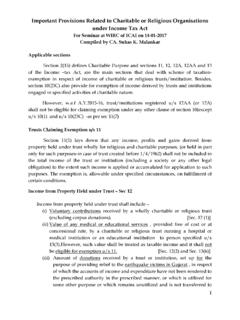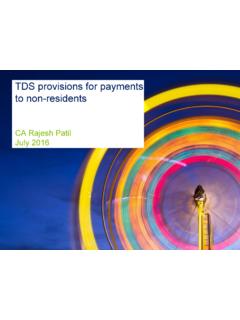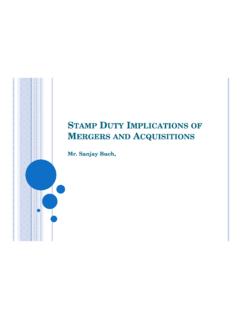Transcription of registration of societies - WIRC
1 CO- operative societies , PRINCIPLES, TYPES OF societies . AND THE REGISTRATRION OF THE societies . INTRODUCTION. Co- operative movement in our country shall not only stay but also grow in times to come. In spite of the drawbacks experienced in the working and administration of the co- operative societies , they have positively contributed to the growth and development of the national economy. Promotion of thrift, self-help and mutual aid are the fundamental principles of co-operation. The orientations of commercial organization and co- operative organizations are basically different. In a commercial organization, earning and maximizing the profits is the sole motive; whereas in a co- operative organization profit cannot be the sole motive.
2 The prime objectives, in addition to the three fundamentals of co-operation mentioned above are to make available the goods and services in required quantity, of better quality and at a reasonable price to its members. It does not mean that a Co- operative society is a charitable organization. It should, therefore, conduct itself in a business like manner in attaining its objectives efficiently. Broadly speaking there are three sectors operating in the Union of India. 1. PUBLIC SECTOR wherein the State The Union of India and the respective State Government undertake developments projects which are wholly owned by either the Central Government or the State Government. 2. PRIVATE SECTOR which is a sector where private enterprises are permitted in certain fields of economic activities.
3 3. CO- operative SECTOR which is beautifully blended in between a public sector and the private sector. It has benefits of both the sectors and disadvantages of neither of them. PRINCIPLES OF CO- operative SECTOR. 1. LEGAL STATUS : A co- operative society is a body corporate registered under the applicable state Act with perpetual succession having a common seal. It can acquire, hold and dispose of properties, enter into contracts and it can sue and it can be sued. 2. VOLUNTARY ASSOCIATION : Co- operative society is essentially an organization or an association of persons who have come together for the common purpose of economic development or for mutual help. 1. 3. SELF HELP AND MUTUAL HELP : The Co- operative societies office bearers/executive committee is elected as per democratic election procedure.
4 The Co- operative society function under the principle of self help and mutual help which means each will help for themselves and all will help others. 4. DEMOCRATIC CONTROLS : The Control of a Co- operative enterprise in not in the hands of capitalists who can corner the share capital and control the interest in any undertaking which would be a private undertaking. 5. EQUALITY : In co- operative Sector, the principle of One man one Vote is provided in the statute so as to ensure that the capital does not dominate the administration of co- operative society . 6. OPEN MEMBERSHIP : Any person can apply for the membership of the society without any discrimination. The membership is open for all.
5 7. SOCIAL APPROACH / NO PROFIT MOTIVE : As the society is working on democratic principle and the office bearers of the society will be functioning like a trustees for the better management of the society and there is no separate benefits to the executive committee members. Service is the main motto and the profit is not the main concern in co- operative societies . 8. PROFITS AND RETURNS TO THE MEMBERS : Co- operative society is an association of members and certain percentage profits earned by the society , as decided in the meeting of the General body will be distributed in the form of dividend to the members. 9. LIMITED INTEREST ON SHARES : Irrespective of the shareholding, each member has only one vote in the decision-making in the General body meeting or at the time of election of the committee for management.
6 The shares are not traded in the stock exchange. The State Co-op. Act also prescribes the maximum amount, which a member can hold as a share capital in any society . Under Act, 1960 as per Section 28 other than Government or other society , shall not hold more than 1/5 of the total capital or interest in shares or exceeding Rs. 20,000/- which the State Government power to change by way of notification. 10. PERSONAL PARTICIPATION : The shareholders have to personally attend the meeting or for voting. They are not allowed to appoint proxies for attending the general body or for voting in the resolution to be passed. 2. 11. EDUCATIONS AND CO-OPERATION : Every society has to contribute towards the education fund maintained and looked after by the district co- operative education Board as per the notification issued from time to time for educating the members or the office bearers of the society .
7 12. CO-OPERATION AMONGST CO-OP. INSTITUTIONS : The funds generated or mobilized through the co- operative societies have to be deposited/ invested in the Co- operative Sector only. ACT & RULES APPLICABLE. A Co- operative society functions as per the provisions of 1. Co- operative societies Act under which the same is registered. 2. Co- operative societies rules made there under 3. Bye-laws approved by the registrar at the time of registration and amendments made from time to time and approved by the registrar. 4. Notification and Orders 1. Co- operative societies Act We have a number of Co- operative societies Acts functional in different states like - Maharastra Co- operative societies Act, 1960, - Pondicherry Co- operative societies Act, 1972, - Karnataka Co- operative societies Act, 1959, - Delhi Co- operative societies Act, 1972, - Kerala Co- operative societies Act etc.
8 When the area of operation is restricted to one state, the State Co- operative Act & Rules, under which the society is registered will be applicable. In a particular state, if Co- operative Act and Rules is not enacted, the Central Act which is known as The Co- operative Act, 1912 and its rules will be applicable. When the area of operation of society is spread in two or more states. The Multi-State Co- operative societies Act, 2002 and its rules shall be applicable. 2. Co- operative societies Rules A set of rules is also framed under the respective State Co- operative Act for procedural aspects. 3. Bye-laws Each society also registered with the bye-laws for internal management of the societies duly approved by the registrar at the time of registration of the society .
9 The bye-laws of a society constitute a contract 3. between a member and the society and it provide for the management of the society . The bye-laws are framed within the provisions of the Act and the rules made there under. Bye-laws include the objects of the society and completely define and restrict the society 's activities, but the rights and liabilities of members are determined by the Act and Rules and not by the bye-laws as such. 4. Notification and Orders issued from time to time by the Government, or any other Authority as prescribed under the Act, Rules there under. TYPES OF societies . A society is categorized on the basis of its objects. There are various types of societies that can be formed under the Act under which it is registered: Under Maharashtra Co- operative societies Act, 1960 following types of societies can be registered : 1.
10 Agricultural Marketing society : As per section 2(1) agricultural marketing society means a society - (a) The object of which is the marketing of agricultural produce and the supply of implements and other requisites for agricultural production, and (b) Not less than three-fourths of the members of which are agriculturists, or societies formed by agriculturists. 2. Consumer society As per Section 2(9) Consumer's society means a society , the object of which is - (a)The procurement, production or processing, and distribution of goods to, or the performance of other services for, its members as also other customers, and (b) the distribution among its members and customers, in the proportion, prescribed by rules or by the bye-laws of the society , of the profits accruing from such procurement, production or processing, and distribution.












